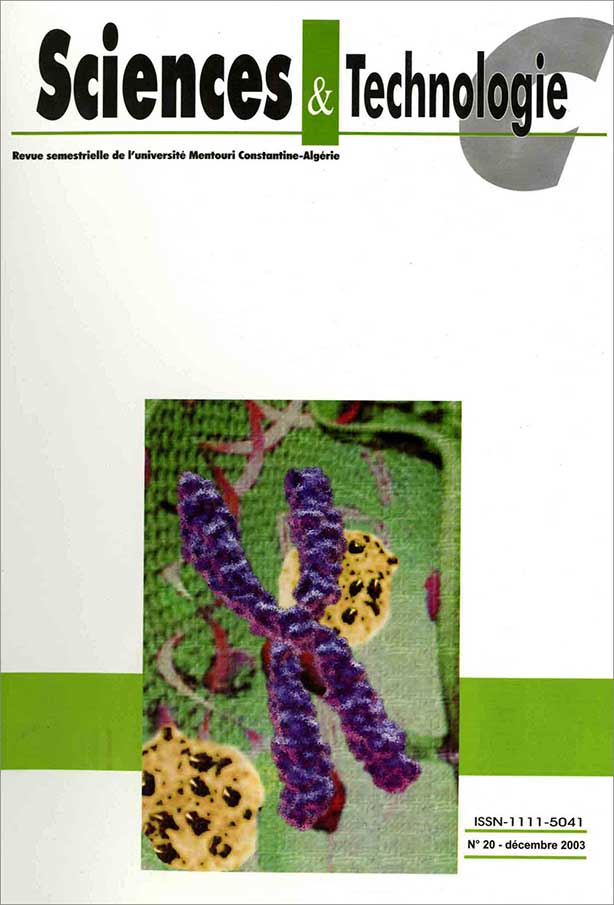EXTRACTION ET CARACTERISATION D’UN AGENT ANTIBACTERIEN DE TYPE HALOCINE PRODUIT PAR UNE SOUCHE BACTERIENNE HYPERHALOPHILE
الكلمات المفتاحية:
Halophilic bacteri، Extremophils، Halocins، Purification، Characterizationالملخص
Les hyperhalophiles, représentants du domaine Archaea, produisent des composés antibactériens apparentés aux bactériocines, appelés halocines ou archaeocines
Dans cette étude, une souche bactérienne productrice performante, désignée P3, sélectionnée parmi six autres souches bactériennes hyperhalophiles productrices, est utilisée pour produire, extraire, purifier et caractériser son agent antibactérien désigné BP3
المراجع
- Price L.B. and Shand R.F., "Halocin S8: a 36-amino-acid microhalocin from the Haloarchaeal strain S8a", J. Bacteriol., vol. 182 (2000), pp.4951-1958.
- Rodriguez-Valera F., Juez G. and Kushner D.J., "Halocins : salt-dependant bacteriocin produced by extremely halophilic rods", Can. J. Microbiol., vol. 28 (1982), pp.151-154.
- Torreblanca M., Meseguer I. and Ventosa A., "Production of halocin is a practically universal feature of archaeal halophilic rods", Lett. Appl. Microbiol., vol. 19 (1994), pp.201-205.
- Meseguer I. and Rodriguez-Valera F., "Production and purification of halocin H4", FEMS. Microbiol. Lett., vol .28 (1985), pp.177-182.
- Meseguer I., Rodriguez-Valera F. and Ventosa A., "Antagonistic interactions among halobacteria due to halocin production"», FEMS Microbiol. Lett., vol. 36 (1986), pp.177-182.
- Torreblanca M., Meseguer I. and Rodriguez-Valera F., "Halocin H6, a bacteriocin from Haloferax gibbonsii", J. Gen. Microbiol., vol. 135 (1989), pp.2655-2661.
- Torreblanca M., Meseguer I. and Rodriguez-Valera F., "Effects of halocin H6 on the morphology of sensitive cells", Biochem. Cell. Biol., vol. 68 (1990), pp.396-399.
- Platas G., Meseguer I. and Amils R., "Purification and biological characterization of halocin H1 from Haloferax mediterranei M2a", Int. Microbiol., vol. 5 (2002), pp.15-19.
- Platas G., Meseguer I. and Amils R., "Optimisation of the production of a bacteriocin from Haloferax mediterranei Xia3", Microbiologia SEM., vol. 12 (1996), pp.75-84.
- Shand R.F., Price L.B. and O’Connor E.M., "Halocins : protein antibiotics from hypersaline environments", In: Oren A (ed) Microbiology and biogeochemistry of hyper saline environments, CRS Press, Boca Raton, (1999), pp. 295-306.
- Rdest U. and Sturm M., "Bacteriocins from Halobacteria", In: Protein purification : micro to macro, R. Burgess (ed.), Alan R. Liss, Inc., New York, N.Y., (1987), pp. 271-278.
- Cheung J., Danna K.J., O’Connor E.M., Price L.B. and Shand R.F., "Isolation, sequence, and expression of the gene encoding halocin H4, a bacteriocin from halophilic archaeon Haloferax mediterranei R4", J. Bacteriol., vol. 179 (1997), pp.548-551.
- Bouktit N., "Contribution à la purification et caractérisation d’une halocline à partir d’une souche hyperhalophile locale", thèse de magister, Université de Béjaïa (2001), p.68.
- Schved F., Lalazar Y., Henis Y. and Juven B.J., "Purification, partial characterization and plasmid-linkage of pediocin SJ-1, a bacteriocin produced by Pediococcus acidilactici", J. Appl. Bacteriol., vol. 7 (1993), pp.67-77.
- Bradford M., "A rapid and sensitive method for quantification of microgram quantities of protein utilizing the principle of protein dye binding", Anal. Bioch., vol. 72 (1976), pp.248-254.
- O’Connor E.M. and Shand R.F., "Halocins and sulfolobicins: The emerging story of archaeal protein and peptide antibiotics", J. Ind. Microbiol. Biotech., vol. 28 (2002), pp.23-31.
- Haseltine C., Hill T., Montalvo-Rodriguez R., Kemper S.K., Shand R.F. and Blum P., " Secreted Euryarchaeal microhalocins kill hyperthermophilic Crenarchaea", J. Bacteriol., vol. 183 (2001), pp.287-291.
- Meseguer I. and Rodriguez-Valera F., "Effect of halocin H4 on cells of Halobacterium halobium", J. Gen. Microbiol., vol. 132 (1986), pp. 3061-3068.
- James S.G., Holmstrom C. and Kjelleberg S., "Purification and characterization of a novel antimicrobial protein from the marine bacterium D2", Appl. Environ. Microbiol., vol. 62 (1996), pp.2783-2788.

